ILLINOIS EXTENSION 2022

 Karla Belzer County Director
Karla Belzer County Director


 Karla Belzer County Director
Karla Belzer County Director
When I think about the tremendous contributions of Illinois Extension in Carroll, Lee, and Whiteside counties this past year, an image of a path – much like the one on the front cover of this report – comes to mind.

Paths lead and guide us to our destination. Whether a well-trodden path to a familiar place or an exciting journey to a new destination, following a path presents an opportunity for growth and learning.
As I consider this metaphor, I am reminded that University of Illinois Extension remains your best and most reliable educational resource that can enhance or even change your path. Every day, while working with our friends and neighbors, Extension staff dedicate themselves to living out the Extension mission, creatively responding to community needs to benefit the health and well-being of all. Through researchbased education and programming, our staff intervene in local communities to change lives. This past year, we addressed important issues, such as developing the local workforce, food access, and health and well-being.
While walking the path of improving lives, Extension staff do not walk alone. We count on the passionate dedication of our 4-H volunteers, Master Gardeners, and Master Naturalists to maximize the benefits in our communities. We also count on the continued commitment of our many devoted community partners as we come together to make gains and expand our reach.
As you read this impact report, I hope you discover the many ways we lead and guide others to their desired destinations. From assisting youth in developing lifelong skills of mastery to helping adults grow and prepare food to eat, to strategizing on developing the workforce, to improving the natural environment, Illinois Extension is a consistent, reliable partner in helping you discover, enhance, or redirect your path.
It is a great honor to serve our communities in the journey of learning, growth, and development. As we enter 2023, we remain committed to providing impactful education that has the power to change your path!
Thank you for your continued support of University of Illinois Extension.
Karla Belzer County Director
The University of Illinois UrbanaChampaign’s land grant mission thrives each day through Extension’s programs, resources, knowledge, and dedicated staff that are responsive to five grand challenge themes:
2022 Engagement
Community: Support Strong and Resilient Residents
Economy: Grow a Prosperous Economy
Environment: Sustain Natural Resources at Home and in Public Spaces
Food: Maintain a Safe and Accessible Food Supply
Health: Maximize Physical, Mental, and Emotional Health
Extension leaders, staff, and stakeholders define priorities that create meaningful, mission-centered outcomes throughout the state:
The Lee County Homemakers Education Association has a long history with Illinois Extension and Lee County dating to 1925. The idea of a Home Bureau in Lee County was conceived by a small group of Lee County Farm Bureau workers who felt that local women should have an organization of their own. In December 1925, the group invited the LaSalle County University of Illinois home advisor to the Lee County Farm Bureau annual dinner to share the value of Home Bureau. The talk was so inspiring that 80 women instantly mobilized, developing a temporary organization and creating tentative sign up for the new organization.
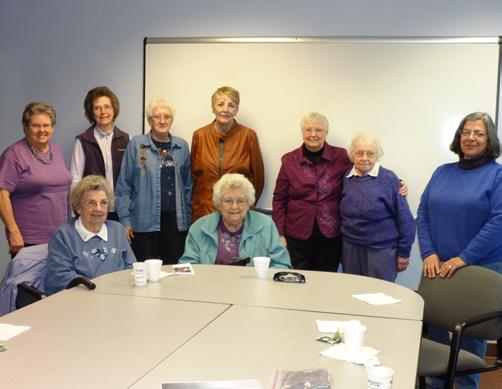
The organization’s development moved quickly, with two women appointed as delegates to the Second Annual Meeting of the State Home Bureau at University of Illinois Urbana in January 1926. The newly organized state program was an outgrowth of the Cooperative Extension Service created in 1914 by the Smith-Lever Act. The purpose of Extension work was to improve rural living and family and community life. Before the Extension Service, there was little way of delivering knowledgebased information first-hand to those not attending college.
On April 23, 1926 at the Methodist Church in Amboy, the first Lee County Home Bureau meeting was held to elect temporary officers. Since the newly formed organization was without funds, the Lee County Farm Bureau offered aid. A membership drive was organized by four district chairwomen within the county. From 1926 to 1927, nearly 40 different groups of women were addressed, with 200 women signing cards as members of Home Bureau.
On October 22, 1929, the first business meeting of the permanent organization was held at the Methodist Church in Amboy. A charter was issued that made Lee County the 25th county in Illinois to adopt Home Bureau. Officers were elected, and 325 members were recorded.
The group underwent several name changes in its 93 years; its first was the Lee County Home Bureau. In 1962, its name was changed to Lee County Homemakers Extension Association, and in 1996, to Lee County Homemakers Education Association. Regardless of the name, the purpose has remained the same, an organization dedicated to home, family, and community.
A few courageous women started the organization with a vision of a satisfying home environment, better health for their children, and safer, more nutritious food for their families while developing more self-confidence and leadership skills to change their community. Today’s members are indebted to those dedicated, pioneering women.
Not only have I learned helpful, reliable, unbiased research-based information from Illinois Extension, but I also had the opportunity to develop friendships with many generous and talented women in Lee County and throughout the state of Illinois. It was believed, at the time, that by the end of 20 years of membership, you had the equivalent of a 4-year college education through the lessons received. I am proud and honored to have been a member of such a generous, humble, and talented group of women.
Shirley Rees, PresidentIn March 2023, the Lee County Homemakers Education Association will hold its final meeting. Times have changed, and the women of the organization have focused on newer and more efficient ways of working to continue to educate themselves and their families about current issues. Working in partnership with Illinois Extension, the Lee County Homemakers Education Association is grateful for all the support Extension has offered over its 93-year history. And, while Illinois Extension will continue to be a source of programming and support to residents of Lee County, the Lee County Homemakers Education Association leaves a remarkable history of education and service to the citizens of Lee County.


When Carroll County Extension volunteer Nancy Gmitro and her late husband, John, saw an historic but decaying house on the edge of Mt. Carroll, they made it their mission to resurrect a significant piece of local history. The house, built by David Emmert in 1841, is the second oldest in Mt. Carroll. While the city of Mt. Carroll considered removing the building after a flood severely damaged the structure, Gmitro worked tirelessly to gather a team of volunteers to help with the Stone House project.
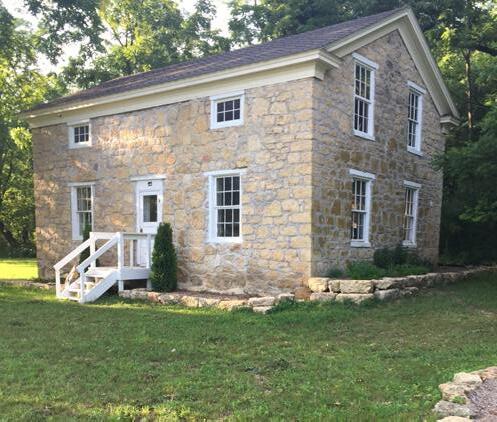
Whether volunteering, advocating, contributing, or leading, community pride soars when residents see themselves as part of the solution to address local issues. As an added benefit, decision-makers can best enhance community vitality and improve the quality of life in rural and urban areas when equipped with the required skills and research-based information.
Using individual strengths, the team worked together for years to resurrect the structure and preserve its history. While other volunteers used their talents to restore the interior and exterior of the building, Gmitro labored hundreds of hours on the outside grounds of the property, restoring it with native plants and prairies.
Painstakingly, the house was put together one stone at a time, and 15 years later, the Stone House Memorial Park was dedicated and opened to the public, becoming an educational destination for Mt. Carroll. The Stone House Memorial Park provides school tours, community gatherings, and picnic sites for all to enjoy. Period furnishings and art embellish all three stories and can be viewed from the interior glass walkway down the center of the house.
During community gatherings and school tours, Carroll County Master Gardeners are on-site to speak about the plants and prairies that grace the restored property. The plants provide historical information on what life was like in 1841. Markers explaining the usage and names of the plants will be added soon so passers-by can learn too.
Thanks to Gmitro, the talented team of volunteers, and financial donors, the Stone House Memorial Park provides a gift of history to the community that will live on forever.
Each growing season, April through July, the enthusiastic Master Gardeners of Lee County provide a unique opportunity to local youth, a chance to grow their own garden. Meeting weekly, the youth, under expert guidance and assistance from the Master Gardeners, plant, water, and weed their gardens. 4-H youth are solely responsible for their garden plot and take care to learn all aspects of growing their produce. They have the option to grow flowers, vegetables, or herbs to show at the Lee County Fair during the last weekend in July.
The 2022 Jr. Gardener program had a banner year, with members growing zinnias, tomatoes, green beans, peppers, and more. Specifically, Brooklyn Strub, a program member for many years, grew some outstanding vegetables in her Jr. Gardener Garden. Brooklyn carefully selected quality vegetables from her garden plot to show at the county fair where she won the Best of Show and State Fair awards. Brooklyn’s success didn’t stop at the county fair. Examining her garden plot in August to pick only the best of her produce, she made her selections and displayed her award-winning produce at the state fair in Springfield. Her effort and hard work earned her the champion ribbon for vegetable produce at the state fair! Congratulations Brooklyn.

Kids in the Kitchen, a new special interest club, was developed from the Jr. Gardener program. Kids meet once a month during the off-season, learning to use the produce they’ve grown in the garden to create recipes and tasty treats. With the help of devoted volunteers, youth in Lee County are growing, not only in the garden but also in the kitchen!
When most people think of summer camp, they think of fun in the sun. Games, crafts, swimming, and outdoor activities are all experiences provided at the Northern Illinois 4-H Summer Camp. But, for Katie Eggemeyer, a 10-year 4-H member and camp counselor since 2020, 4-H summer camp provides a different experience: an opportunity to learn.
Motivated by her experience as a camp counselor, Katie put the knowledge she learned and the passion she gained as a counselor into her child development project at the 2022 Whiteside County 4-H Show. Building from her experience, Katie based her project on the differences between the behavior of a 9-year-old and a 13-year-old. She completed further research on the physical aspects, social-emotional sides, and developmental concerns of each age group to compare to her experience as a counselor.
Using this information, along with an interactive activity to test knowledge of age-related scenarios, Katie demonstrated her child development mastery and exhibited an outstanding project. Her experience as a 4-H camp counselor not only deepened Katie’s understanding of children but also impacted her life through exposure to future career choices working with children.
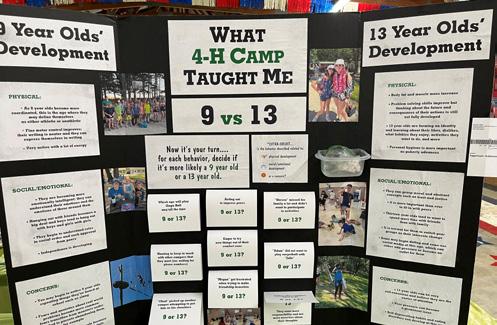
Learning by doing is an outcome of participating in 4-H programs. Developing passion that can impact the future is an even greater achievement!
714 4-H Club Memberships
60 4-H clubs
1,657 Fair exhibits extension.illinois.edu/clw/4-h-and-youth
Peep, peep, peep! That’s the sound of one of the final steps of a successful science experience for 723 Whiteside and Lee County students. Each spring, teachers choose to participate in the embryology program offered by Illinois Extension 4-H youth staff. The program addresses science standards related to the disciplinary core idea of the growth and development of organisms.
Starting in early January, preparations for the embryology program begin. Extension staff conduct outreach to local schools, sharing this hands-on science learning opportunity with educators. Incubators are prepped, supplies are purchased, and fertilized eggs are secured.
To support teachers involved in the program, professional development training is offered to prepare new teachers for their experience. Teachers returning to the program may take a refresher training. Participating teachers gain professional development hours to support their professional educator licensure.
This project is a wonderful experience for my students to predict, observe, and record their observations. We are adopting a new reading curriculum next school year, and this embryology project fits right in with one of the units of study. The project also goes along with the second grade common core standards.
Local TeacherOnce teachers are trained, supplies are delivered, and eggs are in place, it’s ready, set, HATCH! The anticipation builds daily as students and teachers eagerly await the hatchlings.
With incubators in place in the classrooms throughout the month, students learn skills and experience hands-on science activities. Students identify the necessary conditions for the survival of chick embryos. Youth observe and understand the growth and development of chick embryos.
Students also learn how to care for baby chicks after hatching and provide an environment for them to thrive during their first few days of life.
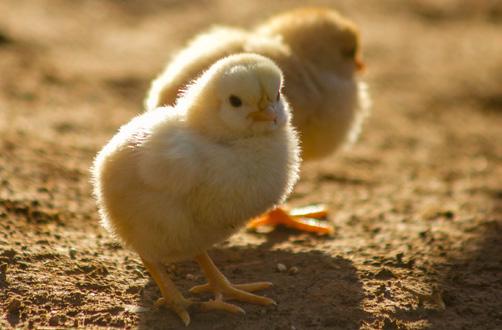
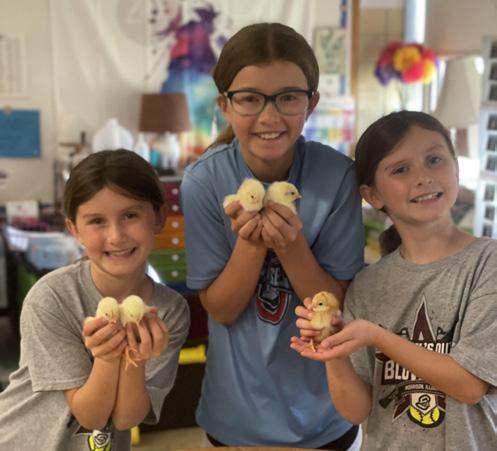
Enterprising educators also use the program to teach about acceptance, differences, and supporting others. Chicks hatch in various colors – yellow, black, brown – allowing educators to engage students in conversations about diversity. At times, chicks hatch with physical limitations or differences, which promotes understanding and learning about ability differences in people and empathy for others. Occasionally, chicks don’t hatch or fail to thrive after hatching, providing opportunities to learn about the life cycle and grief.
Ending in early spring, the program concludes shortly after the chicks hatch. Extension staff work with teachers to retrieve all the program supplies and return the chicks to the farm. While students are often sad to see their chicks go, their departure provides another opportunity for learning – how to let go and move on. With the help of dedicated teachers, Illinois Extension is proud to offer this engaging program that teaches life lessons to local youth.
12 Schools participating 38 Classrooms participating
9 New teachers trained extension.illinois.edu/clw/school-programs
Recognizing the need for face-to-face horticulture programming within the community, a pilot group of Master Gardeners initiated a program planning committee in 2020. Over the course of two years, this hard-working group of five dedicated Whiteside County Master Gardeners developed a list of educational topics, from outreach to research. Since all Master Gardeners have a responsibility to provide educational outreach, the topic list provides all Whiteside County Master Gardeners with ideas and input for educational programming and volunteer opportunities.
It wasn’t long before the coordinated efforts of this group began to bear fruit in the program. The Master Gardeners presented two programs before the pandemic.
In 2021, the volunteers presented seven programs with an average attendance of eight participants. Their efforts continued in 2022 with “Saturdays with a Master Gardener,” a series of seven program topics that averaged 12 participants. Participants indicated an 80% improvement in subject matter knowledge. They said they were eager to apply new knowledge and enhance the gardening experience.
The impact of the Master Gardeners’ programming efforts is felt throughout the county. Participants say the group is welcoming and helpful in their programming approach and that the presentations are well-prepared and presented.
“I am encouraged to start annuals from seeds,” says one participant. Community members attending the programs prepared by the Master Gardeners regularly comment on the effectiveness and teamwork approach of the group, sharing their compliments and desire to attend future programming.
The Whiteside County Master Gardeners were honored at the Annual State Master Gardener Conference with the 2022 Teamwork Award, proving that teamwork certainly is at the head of any great achievement.
2022 Total Impact: Environmental and Natural Resources
7,140 Program attendance
266 Educational sessions
extension.illinois.edu/clw/master-gardeners
Landscapes and gardens. Fruits and vegetables. Trees and lawns. Insects and pests. During 2022, these issues were addressed by Illinois Extension experts who provided research-based answers to garden questions. Illinois Extension horticulture educator Bruce J. Black provided over-the-phone expert assistance to 119 community members.
As more people spend increased time in their home landscapes and gardens, callers seek assistance about trees and vegetables. Due to environmental stress and changing weather patterns, tree issues have increased locally. Callers concerned about their vegetable gardens had problems with tomato plants, including foliar diseases such as leaf spot, and insect issues often related to stink bug damage.
As the weather got cooler, household insects and pantry pests calls increased, with community members noticing unknown bugs and pests in their homes. To address the issue and recommend pest removal, Black encouraged callers to bring live insects or whole specimens to the office.
Most insects identified in 2022, such as the Masked Hunter or leaf beetle, were “hitchhikers” from outdoor gardens that made their way inside the home. One kitchen pest identified was the Larder Beetle which looks for meat or animal byproducts for food and dead insects in the home.
In addition to Black, the Master Gardener Help Desk served residents in Carroll, Lee, and Whiteside counties. Master Gardeners answered 48 calls for assistance this year. These calls helped homeowners make informed decisions to achieve a successful resolution to their nature-related problem.
Whether big or small, assistance, guidance, and direction for all things in the home landscape is just a phone call away with Illinois Extension expert assistance calls and Master Gardener Help Desks.

Winter in northern Illinois is often viewed as a desolate season. With snow on the ground, cold temperatures, and limited flora and fauna, the urge to hibernate indoors until the bright and warm days of spring is real. While it may seem like an inactive season, there are many reasons to explore the natural world and venture outdoors.
Have you ever taken a winter walk or hike and wondered, what tree is that? With the absence of leaves in the dormant season, it may seem that there aren’t many clues to identify the trees. By focusing on non-leaf characteristics and with the help of a field guide, winter tree identification can be fun and rewarding.
Illinois Extension Master Naturalists provided the “Barking up the Right Tree” program to enhance the exploration of the world of winter trees while discovering the basics of non-leaf characteristics. The program featured a winter tree ID guide to educate participants on clues to identify trees in the winter. The Savanna Museum and Cultural Center presentation included a hands-on demonstration of twig identification using winter tree ID dichotomous keys. The field experience concluded with a hike of the High Point Trail at Mississippi Palisades State Park.
Spending time outdoors in any season benefits the mind, body, and spirit. With the proper tools and guides, all can enjoy the beauty and wonder of the natural world in every season.
The average American spends 93% of their life indoors, according to the Environmental Protection Agency. In buildings. In the workplace. In schools. In vehicles.
Being disconnected from the natural world depletes the immune system, robs energy, makes one more sedentary, and affects mood. Current figures indicate the average adult only spends 7% of their life outdoors. The Master Naturalist volunteers are determined to change that.
There’s no better way to get out and explore the natural world than to learn what you might find out there. Carroll, Lee, and Whiteside Master Naturalists developed “Wild Palisades.” Held at the Savanna Museum and Cultural Center, Extension Master Naturalists delved into the spring wildflowers, wildlife, and toadstools common to the Mississippi Palisades State Park in a three-part presentation. After the presentation, participants practiced what they learned by joining in on a hike of the Sentinel trail.
Exploring the natural world is just one way to boost interest in natural environments and spend more time outdoors, making a positive impact on physical, mental, and emotional health.
Val Gunnarsson, mayor of Savanna, sent an email to share the positive benefits of the program:
“A few weeks ago, my wife and I were among about two dozen persons following you on a tour you led along one of the trails in the Palisades State Park. I’ve lived in Savanna nearly all my life, and I’ve been to the Palisades Park hundreds of times over the years, but your tour – which was to show us and teach us about the mushrooms and fungi of the woods – was fabulous. It was one of my most enriching experiences in the park. I am writing to encourage you to arrange more nature tours of this gorgeous park. There are so many wonders of nature to be explored at the Palisades; I hope you will do more.”
Increasing interest in the natural world, boosting energy, connecting with nature and others, and moving more are just a few ways Extension Master Naturalists encourage others to get outside more!

14 Master Naturalist volunteers
1,185 Total volunteer hours
$36,707 Value of Volunteer Labor
1 Volunteer full time employee equivalent extension.illinois.edu/clw/master-naturalist-program
Recovering from addiction is full of ups and downs. Managing symptoms, learning new ways to cope with stressors, and building a supportive network are all needs experienced by those recovering from addiction. One important factor of recovery is hope. Hope motivates change. Hope in tomorrow.
Similarly, planting a garden is also about hope. Hope that something will grow and produce. Hope that something beautiful will happen. Hope in tomorrow.
The Lee County Master Gardeners are agents of hope and encouragement in their partnership with Sinnissippi Center’s

Amboy Recovery Home for women. The Master Gardeners provide monthly garden lessons to women at the recovery home. Seasonal informational packets of horticulture and gardening activities and educational material teach a skill and, indirectly, inspire hope.
Monthly lessons inspire an interest in growing produce, using fresh garden items for better nutrition, and understanding nature’s role in self-care. Garden topics include apples, pumpkins, strawberries, nature crafts, nature journaling, popcorn, Christmas cactus, beginning gardening, planting flowers, flower meanings, and alternative gardening ideas. This program allows the women at the recovery home to appreciate the world’s beauty, explore a new skill, and develop a healthy coping mechanism while experiencing a touch of home away from home.
The Master Gardeners enjoy developing new packets each month to address seasonal interests and current trends. Engaging in new ways to spark an interest in an audience that needs positive reinforcement and encouragement is a driving force for these dedicated Extension volunteers.

33 Master Gardener Volunteers
2,412 Total Volunteer Hours
$74,707 Value of Volunteer Labor
1 Volunteer full time employee equivalent
The last several years have been difficult on individuals, families, and communities. In times of stress and uncertainty, the mental health of friends, families, neighbors, and even ourselves can be threatened.

According to the National Alliance on Mental Illness, 38.5% of adults and 8.9% of youth ages 3 to 17 in Illinois reported symptoms of anxiety or depression in the past year. Rates of drug overdose, substance use disorders, and suicide are also increasing among Illinois residents. Sadly, one-third of Illinoisans did not receive needed mental health care due to cost or transportation barriers.
Although a heavy topic, a necessary topic. I feel far more equipped and comfortable in situations that might involve a mental health challenge or crisis.
Program Participant
It is now more important than ever to build a community support system to help people seek assistance and services when mental health challenges arise. Mental Health First Aid is a course that teaches how to identify, understand, and respond to signs of mental illnesses and substance use disorders, taking
The most relevant thing I learned in the training was the steps for assessing mental health challenges. I am now feeling much more comfortable helping a friend or family member with a challenge.
Program Participant
the fear and hesitation out of starting conversations about mental health and substance use while providing a pathway to hope, support, and recovery. And the best part? Anyone can be trained in Mental Health First Aid.
Many of us know how to respond if we witness someone in medical distress; we would administer aid or call 911. However, very few people know how to respond if someone is having a panic attack, expressing suicidal thoughts, or showing signs of alcoholism. Being trained in Mental Health First Aid improves
understanding and provides an action plan that teaches people how to safely identify and address potential mental illness or substance use problems. The goal is to provide hope with facts while supporting the individual until appropriate professional help arrives. This intervention can mean life or death for some individuals.
Mental Health First Aiders learn an action plan that helps them assess risk, listen non-judgmentally, give information and reassurance, and encourage appropriate professional help. Participants learn risk factors and warning signs for mental health or substance use problems in an engaging and interactive format.
In 2022, University of Illinois Extension provided eight Mental Health First Aid courses in partnership with Sinnissippi Centers to 88 participants in Carroll, Lee, and Whiteside counties, equipping participants to provide mental health first aid in workplaces, schools, and community organizations.
This training will make all the difference for the students that I work with. Many of them are struggling, and while I’ve done my best to help them, I am now better prepared to assist them in navigating these difficult times.
Program Participant
Illinois Extension is proud to bring this important and lifesaving training to communities.
This article is supported by research data from the National Alliance on Mental Illness, Illinois Department of Public Health, and the Illinois Suicide Prevention Strategic Plan.
Many families, especially families with limited incomes in our community, rely on processed foods for meals. Often, caregivers need more time to shop, prep, and cook healthy meals. The lack of access to healthy foods or what to do with fresh produce impacts food insecurity in our community.
To help address these issues, the University of Illinois Extension SNAP-Ed team in Whiteside County partnered with the YMCA 21st CCLC summer program at Merrill School in Rock Falls to teach youth how to prepare fresh ingredients, read and make recipes, and safely cook in the kitchen as part of the Illinois Junior Chef program. With the support of the 10 adult teachers of the CCLC summer program, 35 youth in grades 4 through 8 participated in the five-week class.
Students learned to correctly measure ingredients; use stoves, ovens, and microwaves; identify and use proper knives to cut, chop, slice and dice; use kitchen utensils and techniques to prepare recipes; choose ingredients from the MyPlate food groups; and season food using herbs and spices.
Students tried foods they said they didn’t like, but changed their minds when they tried them. The staff were surprised to see students eating onions and peppers. The students and staff truly look forward to the Junior Chef Program. Paula Garcia of the 21st CCLC Summer Program, Merrill School, Rock Falls, IL
Youth became more confident in the kitchen, a skill that will aid them in their future use of their kitchens. In addition, being able to prepare food encourages children to eat better.
The students enjoyed prepping, making, and eating the food they made. It was great watching them experience new foods. The school was impressed the Illinois Extension staff came in with everything they needed, saying they were efficient and well prepared.

In addition to kitchen techniques, youth learned that not all meals have to come from a box or a can, and that fresh produce can be delicious. Recipes prepared by the participants included:
• Pizza Quesadillas

• Huevos Rancheros
• Pasta Salad
• Fruit Yogurt Parfaits
• Pumpkin Pancakes
• Apple Nachos
• Fruit Salsa
• Apple Crisp
By building confidence, introducing healthy food options, and mastering basic kitchen skills, food insecurity can be reduced among youth in Whiteside County.
7
Partnerships with K-12 Schools
389 Nutrition education classes
2,110
Total Estimated SNAP-Ed reach
Many Illinois families rely on assistance from food pantries to access nutritional food and stretch their food budget. Local food pantries strive to meet the community’s needs and work to secure fresh, nutritious food for local individuals and families. To help food pantries best serve their clientele, the Illinois Extension SNAP-Ed team offers expert assistance, sound guidance, and supportive direction to enhance food pantry services and the client experience.
A hidden gem in southwest Sterling, the New Hope Baptist Church in Como, offers a unique and individualized experience for pantry guests. While volunteers guide patrons through the self-serve pantry, guests can shop for their food needs independently and are encouraged to select healthy food options.
The Nutrition Environment Food Pantry Assessment, administered by Illinois Extension, establishes a service baseline for pantries and outlines areas of improvement. This year, the assessment was conducted at several local pantries, including the New Hope Baptist Church pantry.

The New Hope Baptist pantry received silver certificate status in recognition of its efforts to improve the environment of the pantry. To further enhance pantry services, SNAP-Ed staff demonstrated how the pantry can help guests make the healthy choice the easiest choice.
Illinois Extension provides clientele with community food resources to make nutrition more accessible. Pantry shoppers read and use the shelf talkers provided by the program to assist them in choosing healthier foods. For example, plantains are difficult to choose if one doesn’t know how to cook or prepare them. With the help of the “You Can Cook!” picture recipe provided by Extension, the plantains are a favorite among pantry families.
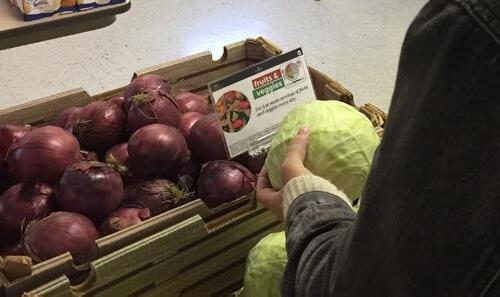
To further provide dignity and choice for pantry patrons, Illinois Extension partnered with the Whiteside County Senior Center to repurpose and redesign their food pantry. The center repurposed a maintenance closet to become the new home of a shopping-style food pantry. The redesigns streamlined operations and allowed easy access to commodities and emergency food needs. The senior center is also incorporating Extension shelf talkers, quantity signs, nutrition posters, and Extension recipes to help promote the use of nutritious choices.
Illinois Extension remains committed to partnering with local agencies to improve the health and well-being of all local residents.
Susie Welch, senior center director, stated that the pantry uses techniques Extension staff taught her, such as displaying fruits and vegetables first before entering the pantry and displaying items with high sugar content toward the end of the shopping experience. Susie stated that these techniques have helped pantry shoppers choose healthier food items to take home to their families.
2022 Total Impact: Food Access, Production, and Safety
Census data shows that 87 of Illinois’ 102 counties experienced a population decline between 2010 and 2020. Kris Noble, executive director of the Sauk Valley Chamber of Commerce, was looking for strategies to rebrand and revitalize her community. She asked Extension Specialist Pam Schallhorn to facilitate the workshop, Reversing the Exodus, which included a panel of young adults who live in the area. These panelists spoke about generational differences in the workplace, what drew them to the area, and what would motivate them to stay. As a result, Sauk Valley committed to providing quality high-speed internet, third spaces, support for entrepreneurs, and mentoring to help young adults become community leaders.
This panel formed the nucleus of the Keystone Group, a permanent working and advisory group of adults born after 1981. The group created a “Welcome Home” campaign designed to welcome young adults who grew up in the area, raised $60,000 in six months for a dog park, and worked with the park district, main street organization, community college men’s basketball team, and a local fence company to build the park.
Keystone Group members volunteer their skills, time, and enthusiasm on community initiatives. One member calls the group a “bridge between where the town has been and where it needs to go.” Members have taken on new leadership roles in the community. One member joined the planning and zoning commission, and two became members of the city council.
“Extension provides the data and strategies, and we make it come to life,” says Noble.

This article first appeared in the 2021 Community Development Extension Impact Report. bit.ly/2021ImpactNCRegion
According to the University of Illinois’ Department of Recreation, Sports, and Tourism, “rural and nature-based tourism is one of the fastest growing segments in the tourism industry.” (2022 U of I Community Report – Savanna)
To tap into this trend, Savanna in Carroll County, is one subject of the two-year “I-Rural” project, which involves the collaboration of local Extension staff with faculty members
from University of Illinois. Professors from the Department of Recreation, Sports, and Tourism help rural communities enhance the strength of their tourism offerings.
In year two, two surveys have been conducted, one asking over 1,000 people from eight Midwestern states questions about rural tourist behavior in general and a smaller survey of individuals who had visited Savanna to collect their positive and negative impressions of their visits to the area. In Carroll County, Extension staff working in community and economic development helped generate responses to the survey. Staff spoke with visitors to Savanna during some of the 2022 summer events, including Memorial Day weekend and the annual Shadfly Festival in August. Extension staff also leveraged social media to collect impressions and generate data for the campus researchers.
Using this input, the faculty reviewed the data and produced a preliminary report. They noted the words most frequently used to describe images of Savanna included “nature,” “biker,” “quaint,” “good air,” and “good scenery.”
Based on this research, the team encouraged community leaders to invest their marketing budget in promotions in Illinois metropolitan areas, including Chicago. Because RV campers spent 15.5% more than average rural travelers, it was also suggested to implement a marketing campaign targeting campers and RV campers.
With this data-driven feedback from the university and Extension, Savanna has additional information to build on recent successes and enhance its tourist-oriented attractions, yielding benefits for individuals and businesses in this beautiful corner of northwestern Illinois.
Nature, biker, quaint, scenery, good air, good location, good scenery
Most frequent words describing Savanna
Palisades State Park, Mississippi River, beautiful scenery, variety of flowers
Most Frequent Words Describing Experiences
Visitors Liked the Most
78.3% Savanna visitors indicated they were likely to come back in the future
extension.illinois.edu/clw/communities
1st Gateway Credit Union
A.C. Mccartney
Ackland Family
Adolph Red Angus
Albany Township
Al’s Quality Service Inc
Alternative Ag Services and Consultants
Baker Family
Bayer Illinois Production
Baylor Family
Blain’s Farm and Fleet of Sterling
Block Family
Boehle Family
CGH Medical Center
Chadwick Lamplighters HCE Unit
Chicago Road Shopper
Clark Carroll Insurance Agency
Community State Bank
Dickson Family
Dixon Township
Dollinger Tree Farm
Donald H Ward Estate
Eastland Fabrication, LLC
Eastland Feed & Grain, Inc.
Elkhorn Grove Township
Fairhaven Township
Farmer’s National Bank
Fenton Township
Flowers Etc.
Forth Family
Franklin Grove Township
Freedom HCE Unit
Gentry Family
Gerken Farm
Hahnaman Township
Henson Family
Hopkins Township
Hoyles Just Right Feeds
Hugh F. Miller Insurance Agency
Illinois FBFM
In Memory of Allan Esgar
In Memory of Charles Hammond
In Memory of Cheri Bakes
In Memory of Donald Ramsdell
Thank you to the individuals who serve on our Extension Council. The Extension Council guides Extension staff when determining programming and outreach efforts.
Carroll County
Nikki Ebersole, Milledgeville
Marcia Zell, Mt. Carroll
Rachel Hill, Milledgeville
Deeann Kramer, Thomson
Lee County
Teresa Smith, Dixon
Melissa Feit, Dixon
Jennifer Lang, Dixon
Emily Zimmerman, Dixon
Eileen Piper, Amboy
Whiteside County
Gordon Kelm, Tampico
Teresa Galloway, Galt
AJ Segneri, Sterling
Mark Ward, Prophetstown
Abbey DeShane, Erie
Pam Martinez, Rock Falls
In Memory of Jennifer Thompson
In Memory of Katherine Reynolds
In Memory of Ottos & Thelma Oleson
Jacoby Family
Jensen Family
Kiwanis Club
Lake Carroll Women’s Club
Lee County Extension Foundation
Lee County HEA
Lee County Pork Producers
Lyndon Township
McCormick Nursery & Landscaping
McCoy Family
Meusel’s Dairy Delite
Milledgeville State Bank
Missle Pork
Morrison Veterinary Clinic
Northern IL Diesel, Inc
Odds N Ends HCE Unit
Palmyra Township
Peterson Farm
Rock Falls Township High School
Rock River Lumber & Grain
Sauk Valley Area Chamber
Sawyer Family
Scott’s Electric
Shank’s Vet Equipment
Stenzel Family
Sterling Federal Bank
Sub-Let Indians 4-H Club
Sullivan Foods
Treter Family
United Hairlines
Veterinary Clinic of Prophetstown, P C
Walnut Grove Angus
Walton Fest
Warner Family
Washington Township
West Point Tree Farm
Whiteside Co Pork Producers
Willow Creek Township
Woodland Township
Thank you to the individuals and businesses who locally supported our funding efforts in 2022.
WHITESIDE COUNTY STAFF CARROLL COUNTY STAFF LEE COUNTY STAFF
Marcia Cruse SNAP-ED Program Coordinator Sheila Miller SNAP-ED Community Worker Abby Noble SNAP-Ed Community Worker Susan O’Connor Marketing & Communications Program Coordinator Jane Shaw 4-H Program Coordinator
Katie McBride 4-H Program Coordinator Marilyn Kemmerer Ag/Natural Resources Program Coordinator
Mary Sheridan Office Support Specialist
The Whiteside County 12923 Lawrence Road Sterling, IL 61081 (815) 632-3611 Fax: (815) 716-8922
(EFNEP). Karla Belzer Unit Director Bruce Black Horticulture Educator Mike Delany CED Educator
Nutrition Lee County 280 W Wasson Rd Amboy, IL 61310 (815) 857-3525 Fax: (815) 857-3527
Programs are funded by the Supplemental Carroll County 642 S East St Mt. Carroll, IL 61053 (815) 244-9444 Fax: (815) 244-3708 /UofIExtensionCLW go.illinois.edu/clw uie-clw@illinois.edu
Program OFFICE INFORMATION ONLINE
contact Martha Ebbesmeyer 4-H & Youth Educator Allie Johnston 4-H Program Coordinator Mary Nelson Ag/Natural Resources Program Coordinator